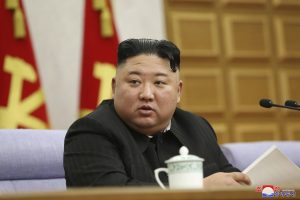The 8th Congress of the Workers’ Party of Korea held early last month was notable for a return to the socialist system of the Kim Il Sung administration. However, Kim Jong Un seems to be more of a pragmatist than his grandfather, who touted the ideal of “Paradise on Earth.” In his nine-hour address, Kim acknowledged the failure of his government’s economic policy. Unlike previous congresses that showcased achievements, this time Kim drew attention to problems and explored ways of dealing with them.
If North Korea is to achieve economic growth it needs sanctions to be lifted. For this to happen, progress in negotiations with the U.S. is vital. However, the change of administration in the U.S. means the road ahead will be hard, which is why “self-reliance” is being promoted as key to economic recovery. Having already factored in the possibility of prolonged sanctions, North Korea now hopes to be able to run its economy under its own steam. “Self-reliance” is a slogan from the Kim Il Sung era, but originates with Mao Zedong. The newly proposed five-year plan is also highly realistic, unlike Kim Il Sung’s “catch up to and surpass Japan” and Kim Jong Il’s goal of creating a “Strong and Prosperous Nation.”
Kim Jong Un positioned the U.S. as the “biggest enemy” and ordered his party to “strengthen the national defense.” Specific reference to military goals such as the development of nuclear submarines and missiles with a range of 15,000 km was undoubtedly motivated by a desire to attract the attention of the new Biden administration. If North Korea simply wished to develop weapons, then it would be better to do so in secret rather than announce it publicly.
Pyongyang’s posture is reminiscent of the Cold War era when North Korea showed hostility toward the U.S., while at the same time touting its friendly relations with the socialist countries of China, Cuba, Vietnam, and Russia.
Wearing a Mao jacket rather than the suit he sported at the last Congress, Kim Jong Un appointed himself General Secretary, reviving the Secretariat Bureau system adopted by the Kim Il Sung administration and the Communist parties of other countries. Out of consideration for his predecessors, Kim Jong Un had hitherto avoided taking the title of General Secretary. Now, in his tenth year in power, he has finally gained the confidence to display his equal status with his father and grandfather.
Whatever his title, however, Kim remains the leader of a party with overwhelming authority to rule. More worthy of note is the progress made in developing a system to entrust specific practical matters to his subordinates. This constitutes the institutionalization of a “group assistant system.” Last year, members of the Presidium of the Political Bureau were reported to have visited typhoon-damaged areas to “provide guidance” on recovery work. Up to then, the only person who could provide guidance in North Korea had been the Supreme Leader. At this year’s Congress, councils were set up for sectors such as industry and agriculture. However, Kim himself was not present and the task of providing guidance was entrusted to members of the Presidium of the Political Bureau. This may be intended both to delegate responsibility to key officials and to ease Kim’s workload.
The rotation of senior personnel at this year’s congress was notable, with military personnel ranking relatively lowly, just as they were five years ago. This demonstrated that the party would continue to lead the nation and its military, flaunting the country’s status as a “nuclear power.” Judging from the number of delegates attending the Congress, the party’s membership exceeds six million, more than twice the number during the Kim Jong Il era. A tightening of the party organization also occurred, including a strengthening of the Central Auditing Commission’s authority to crack down on “anti-socialist phenomena.”
The occasion of Kim Jong Un’s birthday, which fell during the Congress on January 8, was not celebrated. In fact, Kim’s birthday was only reported briefly in Rodong Sinmun during Dennis Rodman’s visit in 2014. While the past decade has seen Kim steadily and increasingly deified, a brake has been put on circulating his portrait and portrait badge throughout society. This may be due to a sense of guilt that he has been unable to deliver as he would have liked on his touted “improvement of people’s lives.”
Kim was not present at the Supreme People’s Assembly that followed the Congress, nor was he appointed president, a post held by Kim Il Sung. In 2012, he became First Secretary of the Party and First Chairman of the National Defense Commission, and in 2016 he became Chairman of the Party and Chairman of the State Affairs Commission. This time, however, his position in the party changed to General Secretary and his position in the nation-state remained Chairman of the State Affairs Commission. In view of the sluggish economy, his appointment as president was apparently put off for the time being.
Although there was a significant rotation of cabinet members at the Supreme People’s Assembly, no announcement was made concerning members of the State Affairs Commission, which is the upper echelon of the cabinet. This may be a sign that in future the State Affairs Commission will remain only in name. Kim Jong Un’s repeated reorganization of the party and state agencies and frequent appointments are evidence of an ongoing process of trial and error in managing the nation state.
Atsuhito Isozaki is an associate professor at Keio University.

































